Southern autoworkers on the rise
Interviews with UAW members before a major strike deadline

It starts to surface in the South in April. It’s rare and synchronized. It has been alive underground for decades, preparing, growing stronger within the grassroots. They’ve already started calling it alien, a foreign invasion (bless their hearts), though clearly it comes right from our soil.
No, it ain’t the aligned cicada brood, about to blanket the South (and beyond) in a manner that hasn’t been seen in two centuries. It’s unlikely to leave behind a fragile shell, or be crushed by boots or gone by summer. Yet something just as extraordinary is happening across the South: Thousands of workers are threatening to strike.
In North Carolina, more than 7,300 members of the UAW are currently locked in a high-stakes contract struggle with the multinational company Daimler Truck North America (DTNA). The union’s master contract was set to expire on Friday, April 26, at midnight. Unless workers received an acceptable contract offer from management by then, they would walk off the job at DTNA’s four big heavy-truck and bus plants in North Carolina, as well as at two smaller parts-distribution facilities, one in Memphis and one in Atlanta.
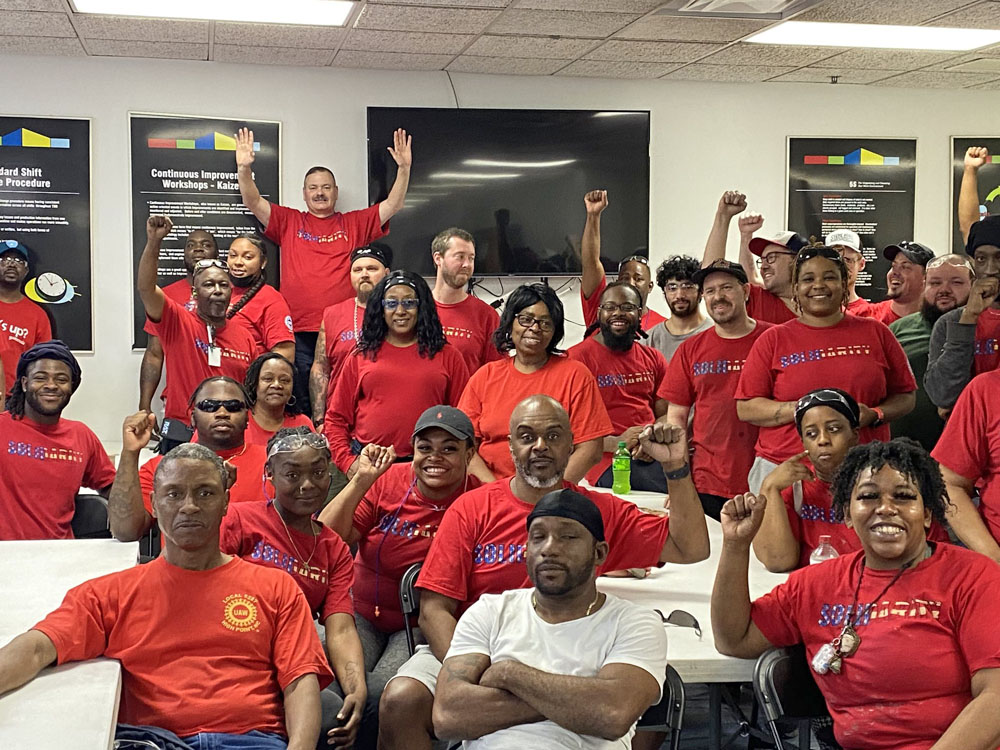
The struggle at DTNA, which takes place within the context of an ambitious campaign by the UAW to organize the all-important Southern auto industry, has major implications for the class struggle in the South and across the country. If workers at DTNA are able to secure a victory, this could provide impetus to other workers to stand up and fight back. Within this context, several unions and workers’ organizations in North Carolina and beyond have announced their solidarity with the DTNA workers in their struggle for a new contract and their efforts to win justice, dignity, and a better life for working-class people.
This article shares the voices of these autoworkers on the precipice of their strike, as well as the voices of public-school teachers from the same communities, who are working to build solidarity with UAW workers at DTNA. The teachers are also struggling to overturn a Jim Crow-era law on the books in North Carolina that bars state, county, and municipal employees from bargaining contracts with their employers.
The South could be on the verge of its largest open-ended strike in decades. No matter what happens, it’s clear that workers in North Carolina are on the move.
* * *
It’s no secret that the South is the worst region for workers in the United States. From the lowest wages to a dearth of worker protections to the crippling denial of a right to organize, the ruling class has the South in a stranglehold.
Nowhere are the conditions worse than North Carolina. In last year’s report by the U.S. affiliate of Oxfam, North Carolina once again ranked last—even 52nd behind Washington D.C. and Puerto Rico—in the “Best and Worst States to Work in America 2023.”
Workers across the whole region are hamstrung by “right-to-work” laws, and North Carolina still clings to a Jim Crow-era law that bans collective bargaining for the state’s hundreds of thousands of public employees. (Even the United Nations has called for its repeal.)
As part of the capitalist class’s efforts to impose a “race to the bottom” and undermine conditions for all workers, corporations use the anti-labor environment in the South to their advantage. The South has been a key site of capital investment in manufacturing in recent years—in no small part because employers know that the area is conducive to the maintenance of high rates of surplus labor value extraction. North Carolina in particular has been the site of a major manufacturing boom in various critical sectors, including EV auto, semiconductors, military/defense production, and other sectors.
All too often, when workers organize and engage in struggle, they are forced not only to fight against their bosses, but also against top regional politicians, as well.
On April 16, the eve of the successful vote by Volkswagen workers in Chattanooga, Tennessee, to join the UAW, Republican governors from six states across the South banded together to release a joint statement “in Opposition to United Auto Workers (UAW)’s Unionization Campaign.” As transparent as it is wretched, the governors wring their hands against the “outside influence” that threatens “the values we live by.” (Not least, the governors are clutching their pearls—and their top-donors’ profits—by pointing out that the UAW “proudly call themselves democratic socialists.”)
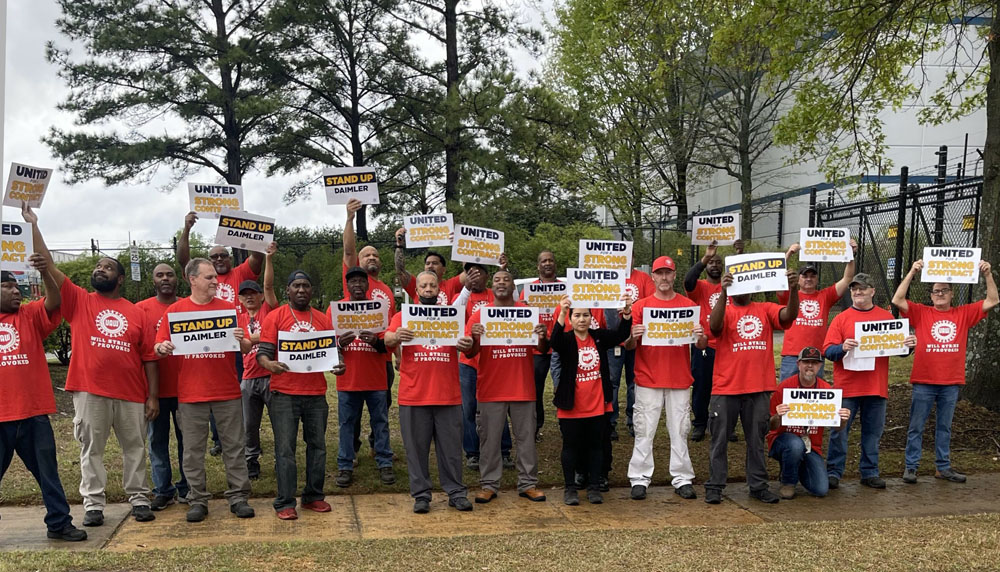
It’s no surprise that in the Oxfam report, the governors’ six states—Alabama, Georgia, Mississippi, South Carolina, Tennessee and Texas—all rank in the bottom eight worst states to work in the country (joined, of course, by North Carolina). Yet they rush to hang their hat on alleged shared values that for the ruling class, ensure power and for the working class, subjection.
In an article about the Volkswagen workers’ vote in the New York Times on April 19, Jamelle Bouie writes,
It is no shock to see conservative Republicans opposing organized labor. But it is difficult to observe this particular struggle, taking place as it is in the South, without being reminded of the region’s entrenched hostility to unions — or any other institution or effort that might weaken the political and economic dominance of capital over the whole of Southern society.
Bouie then correctly couches the current struggle in the “unbreakable addiction of Southern political and economic elites to no-wage and low-wage labor,” adding that: “Before the Civil War, of course, this meant slavery.”
For many in the South, and of course for Black workers in particular, this cruel through-line embodies the elites’ “values” far better than anything they supposedly share with the masses.
* * *
On April 19, workers at the Volkswagen plant in Chattanooga overwhelmingly voted to join the UAW. In mid-May, workers at a Mercedes-Benz factory in Vance, Alabama, outside of Tuscaloosa, will also get a chance to join the union.
But it’s not only unionization campaigns that are igniting the labor movement in the South in a way that hasn’t been seen in many of the workers’ lifetimes. Workers are ready to strike, too.
The UAW has a master agreement across six Daimler Truck North America (DTNA) plants in the South. In North Carolina, these include:
- Mount Holly Truck Manufacturing Plant (Mount Holly, NC; UAW Local 5285)
- Cleveland Truck Manufacturing Plant (Cleveland, NC; UAW Local 3520)
- Gastonia Components and Logistics (Gastonia, NC; UAW Local 5286)
- Thomas Built Buses (High Point, NC; UAW Local 5287)
Additionally, there are two smaller parts-distribution facilities elsewhere in the South that are covered in the UAW’s master agreement:
- Atlanta Parts Distribution Center (Buford, GA; UAW Local 10)
- Memphis Parts Distribution Center (Memphis, TN; UAW Local 2406)
If the union doesn’t have an acceptable proposal from the company at midnight on Friday, April 26, when the current contract expires, then workers at all six of these facilities are going to go out together.
These six plants constitute a major portion of DTNA’s overall production. A strike would send shockwaves ricocheting through the company’s entire North American production network. Across the South, for example, a strike at Thomas Built Buses plants in High Point and Archdale, NC, would also disrupt production at the company’s non-union Freightliner Custom Chassis plant in Gaffney, South Carolina, which produces all of the chassis that used to build school buses at DTNA’s High Point facility. A strike would thus throw much of the production that’s taking place in Gaffney offline.
In addition to this, workers at the Cleveland truck plant, who build Western Star trucks, also produce cabs that are then sent to be assembled on trucks at DTNA’s plant in Portland, Oregon, and at one of the company’s two Mexican plants. While a strike in Cleveland would not shut down these facilities, it nonetheless would impact production there.
Ahead of the strike deadline, I interviewed two DTNA workers: Ben Smith, a welder at Thomas Built Buses plant in High Point, NC, and a member of UAW Local 5287; and Cameron Dunphy, a worker in engine line complexity at the Cleveland (NC) Truck Manufacturing Plant, and UAW Local 3520 member.
Joel Sronce: How long have you been working at DTNA, and what are your positions?
Ben Smith: I’ve worked at Thomas Built Buses, which is owned by DTNA, for two years. I weld school buses together alongside my coworkers on the assembly line. Prior to starting at TBB, though, I worked in non-union manufacturing for many years. I’ve always been a union man at heart. Solidarity forever.
Cameron Dunphy: I have been working at the Cleveland DTNA plant for just over two years now, having worked seven and a half years at Lowe’s Home Improvement, and three and a half years at Bojangles [a regional fried chicken chain] prior to working here.
JS: What’s it like on the shop floors these days? What are the stakes for next week?
BS: The company is making money hand over fist right now. In March, Daimler Truck announced that it had made record profits of 5.5 billion euros (nearly $6 billion) in 2023—an increase in profits of 39 percent over the previous year. As part of this, the company announced a major stock buyback program and an increase in dividends in order to enrich shareholders and corporate bosses. Astoundingly, the CEO of Daimler Truck, Martin Daum, declared during an interview with CNBC that profits for the company were “red hot,” adding that any “leftover money…certainly belongs to our shareholders.”
Meanwhile our wages have stagnated and many workers are struggling to get by and pay their bills. Many workers are living paycheck to paycheck. Our last contract was negotiated in 2018—and we don’t have a cost of living adjustment (COLA) provision. This means that, as a result of skyrocketing inflation in recent years, our buying power has declined by a whopping 13 percent over the course of the past six years, according to research put out by the UAW International.
These economic dynamics are very well understood by workers inside the plants. At my job, we talk about it all the time—during breaks, at mealtime in the cafeteria, and between school buses on the assembly line. As the contract campaign has accelerated, a mood of determination, seriousness, and solidarity has set in on the shop floor. I can say for certain that, while most workers do not want to strike, we are now prepared to do just that if this is what it will take to win justice. Everyone is having discussions with their families about the struggle to come. Union density, I have heard, is up to around 90 percent at Thomas Built Buses. Many of the stragglers that had previously dropped out of the union have rejoined. Back on March 8, UAW workers across DTNA voted by a margin of 96 percent to authorize a strike if necessary.
In terms of demands, the key issues we’re fighting for are: No concessions in our contract; major wage increases; COLA provisions in our contract so that our wages rise with the rate of inflation; an equalization of wages for UAW members across all of the DTNA plants covered under the master contract; and job-security protections.
The company is still playing hardball—and, absurdly, still pushing for concessions on health care.
CD: In the last two years, things have been steadily getting harder and harder, and it’s not easy like it was before. Everyone is struggling in some way, but the ability to struggle against this company to get things better for themselves is firing people up. We have a lot to work to do in educating and connecting to wider struggles but I believe a strike—if it comes to it—will help bring us together.
Unfortunately, past leadership hasn’t always been as militant in fighting for strong contracts, having given concessions every prior contract. Prior administration in the International stopped at least one strike voted on by the membership. Over the past two years I have seen a lot of discouragement within the plant change into excitement even while everyone’s struggling more and more from inflation and corporate greed. The Big Three strike got people talking and nervous about whether the International would support us. This is the first time we’ve had UAW International’s full support and encouragement to get our demands with them saying they’ll back us the whole way.
JS: How connected do you feel to your fellow UAW workers across the country, and what makes you feel more or less connected? What does the future hold for DTNA/UAW workers across the South and country (and world), and how about for workers in general?
BS: In our struggle at DTNA, we feel like we are a part of a broader movement by UAW workers and blue-collar working people more generally. One thing that’s worth noting here in particular is that the monumental, historical victory by workers at the big Volkswagen plant in Chattanooga, who just voted to join the UAW, has the potential to have an impact on our UAW contract struggle at DTNA. The VW union win sends a resounding message to DTNA—and to the employing class in general—that our union is expanding and leading a growing movement to organize the South.
If we win at DTNA, either through waging a strike or not, this will, in turn, also help to build the growing movement to organize the all-important Southern auto industry, as well as other critical sectors of heavy manufacturing.
Crucially, a core part of our movement must be to build solidarity with Mexican workers in auto and related sectors. DTNA, for example, maintains two major plants in Mexico, and the company consistently goes out of its way to pit us against our Mexican brothers and sisters at these plants. Excitingly, the UAW has adopted a policy of fully supporting and providing material assistance and backing to the independent union movement in Mexico.
CD: The future holds the possibility of joining with all non-unionized workers, including EV-battery production workers, and not just at DTNA but across the South in BMW, Toyota, all the little parts manufacturers and anyone who wants to organize. Almost everyone that we’ve reached out to has been receptive without fail… We have to build more relationships between unions and other organizations to facilitate more organizing between all of us.
* * *
Building such relationships is exactly what happened two weeks ago in Greensboro, NC, in an intersection of two of the most important labor forces in North Carolina.
Like autoworkers, North Carolina teachers’ organizing has struggled to gain dignity in the mire of the Tar Heel State’s Jim Crow-era labor laws.
GCAE is a local chapter of the statewide public-school staff union, the North Carolina Association of Educators (NCAE), which in turn is a part of the National Education Association (NEA)—the largest labor union in the United States. In the harshest of the anti-labor, anti-union Southern states, NCAE is a product of incredible solidarity. While there had previously been two groups—the NC Teachers Association for Black teachers, and the NC Education Association for white teachers—the NCAE formed in 1970 in response to school desegregation. Within its first ten years after merging, NCAE successfully organized and won improved maternity leave, salary increases, and longevity pay.
However, as also discussed above, in North Carolina public-sector workers can legally have a union, but they cannot engage in collective bargaining with state, county, and municipal employers. Therefore, the union cannot negotiate pay, employment policies, or working conditions for its members. By current law, the stagnating wages—not to mention outdated resources, unreliable heating and air conditioning, and many more issues that students and workers face—cannot be subject to pressure by organized labor. But the teachers and other public-school workers are fighting nonetheless, including with inter-union solidarity.
On April 11, the Guilford County Association of Educators (GCAE) had its monthly meeting in the library at the Smith High School in Greensboro. It might have been an ordinary Thursday meeting, focusing on the last two months of the school year, were it not for a few new faces. The neighborhood UAW autoworkers had been invited.
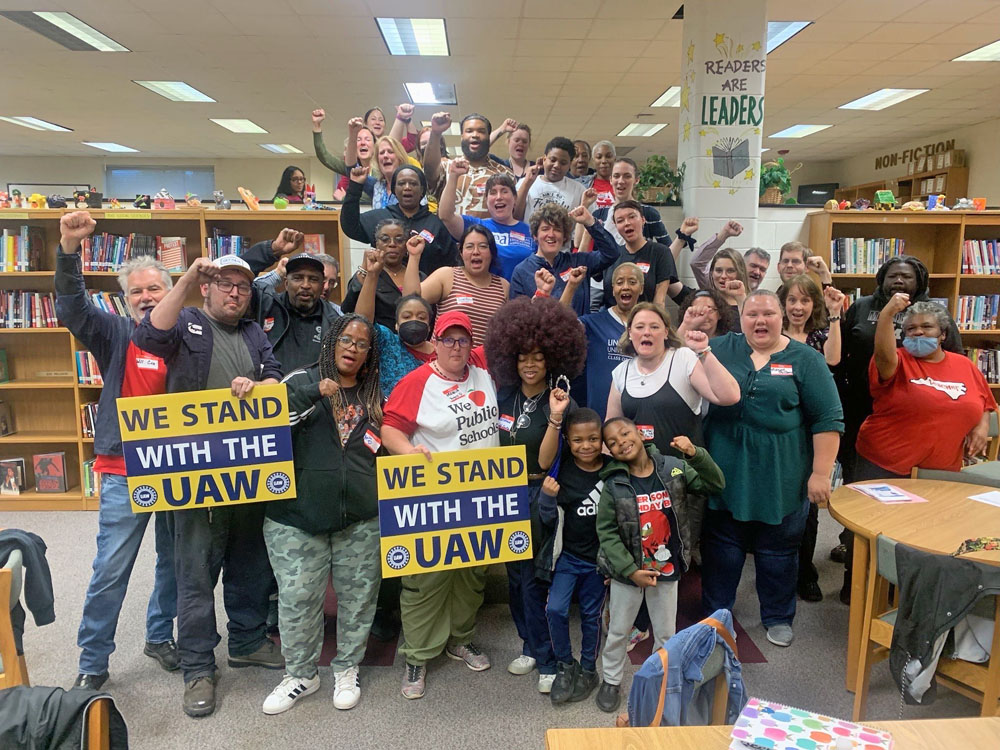
Regarding the teachers’ struggle, and specifically their budding solidarity with UAW workers at DTNA, I interviewed Harris (a pseudonym), a high-school teacher in Guilford County, who has served as association representative—better known as a “building rep”—since 2018. In this role, Harris keeps their coworkers updated on legislative changes that affect school employees, coordinates with their coworkers to get petition signatures, attends monthly county-wide meetings, and makes connections with workers at other schools in their district as well as across the state.
Joel Sronce: Can you share some about GCAE, NCAE, and the most urgent struggles you’re facing now?
Harris: The most urgent struggle for NC public-school employees today is two-fold between the inadequate funding doled out by state legislators and the expansion of private school vouchers (the Opportunity Scholarship Grant Program). The effects after decades of decreased funding are obvious—few schools have reliable heating or air conditioning, elective classes and staff positions are continuously cut, there are not enough support staff (teacher assistants, counselors, or nurses), and classified workers (such as bus drivers, custodians, and school nutrition staff) inevitably have multiple jobs to make ends meet. The issue with private-school vouchers is less well known, but amounts to diverting tax dollars that have been supporting public schools to subsidize tuition at private schools. Vouchers were originally promoted to give low-income families more options, but 2024 marks the end of such income-eligibility requirements—meaning the richest families in NC can send their kids to expensive private schools and redirect millions of dollars away from public schools. NCAE has been fighting against these harmful policies for many years, and GCAE is specifically running a campaign to address both issues.
JS: It was incredible to hear that GCAE invited UAW members—specifically from the Thomas Built Buses plant in High Point, which is also in Guilford County—to its meeting on April 11 in a show of solidarity with their struggle and potential strike. Can you talk about that meeting and what you hope builds from it?
Harris: At that meeting we learned how deeply connected our two groups are. Thomas Built Buses is not only a few minutes away from the schools where we work, but they manufacture the school buses that our students ride in every day. Many of our students have parents or family members who work there as well. As the UAW members spoke about the struggles they are facing while DTNA is raking in profits, every head in the crowd nodded with a deep understanding that we deal with the same types of issues as school employees. Many of the GCAE members in attendance had participated in the 2018 and 2019 mass demonstrations that shut down schools across the state; we knew all too well how necessary and scary it can be to confront your employers, and here UAW members were telling us that they felt compelled to do the same thing. If they didn’t realize it before, every GCAE member left that night feeling inspired by our UAW siblings.
Harris:
JS: And how about at GCAE’s rally at the Board of Education? Can you describe its purpose, the solidarity you received, and what you think the future holds?
Harris: Over 2,300 Guilford County Schools employees have signed GCAE’s petition to address insufficient pay for all school employees as well as the threat of private school vouchers. There are two groups of decision makers who will control the outcome over the next two months – the GCS Board of Education and the Guilford County Board of Commissioners. We have learned in years past that these Boards are more likely to listen when school employees speak out and show up in mass numbers. We will also need widespread participation and support in order to influence their decisions, which is one reason why UAW members attended our meeting a few days before we were to deliver the petitions to the BOE.
About one-hundred people attended our rally at the Board of Education on April 16 to deliver the petition signatures. Employees from dozens of schools showed up in red with their posters, their children, and their desire to be heard. There were uplifting chants and heartfelt stories from various school workers. One of the most empowering parts was seeing UAW members in the crowd; having their support makes our fight feel so much bigger and gives us hope that we aren’t alone.
The NC public school staff union will be ready to support our UAW family in the coming weeks. We know that countless workplace gains have been made solely because of the dedication of labor unions. We want to see UAW win the contract that they deserve because when they win, students and school employees across NC will win. We will add the courage of our UAW siblings to the long list of worker actions in our state’s history, and the lessons they can share with us will make our fight for better schools that much stronger. If an injury to one is an injury to all, then a win for one Union in the South is a win for the entire labor movement.
* * *
GCAE members aren’t the only North Carolina teachers who have gone public with their solidarity. Earlier in April, the wider NCAE released a statement in support of the UAW workers. Its authors are Tamika Walker Kelly, an elementary school music teacher from Fayetteville, NC, and president of the NCAE; and Bryan Proffitt, a high school history teacher from Durham and the union’s vice-president. Like many in the South, they understand the conditions and the stakes surrounding their struggle.
In the statement, they write, “The South is sliding from the margins to the center, our unions are growing, and the North Carolina Association of Educators could not be prouder to stand with our UAW siblings as we work alongside them to secure a state where every family can win.”
To no surprise, their conviction comes in direct contradiction to the six Republican governors’ deceit and distortion of the alleged “values we live by” in the South. The teachers reject that tradition, pointing instead to the path of solidarity and the burgeoning labor movement around them:
We are proud of our UAW family for standing together, and we are encouraged by the upsurge of workers joining and strengthening their unions all over the country, from Starbucks to Amazon to auto plants to schools.
Our state, which still boasts Jim Crow-era restrictions on workers’ rights and among the lowest rates of unionized workers in the whole country, still has a long way to go. But movements like the Daimler workers are leading inspire hope in what is possible, and we look forward to celebrating their win with them on the way towards our own.
They deserve respect, safe working conditions, and stable wages. So do public school workers, and we stand united with our UAW family, and their families, like we do in our schools and communities every single day.
The solidarity across North Carolina doesn’t end there. I spoke to one final member of the state’s labor movement, Jim Wrenn, a former president of the Carolina Auto, Aerospace and Machine Workers Union (CAAMWU), and machine operator on the B-Block Line at the Cummins Rocky Mount Engine Plant (RMEP) in Whitakers, NC. In 2003, CAAMWU received its charter as the private-sector chapter of the statewide UE Local 150, the NC Public Service Workers Union that struggles against the same Jim Crow-era laws as the public-school teachers and other state employees.
For Wrenn, who has been involved in North Carolina’s labor movement since the 1970s, what’s happening not only at Daimler but across the South signifies something new.
“The recent success of the UAW Big Three auto contracts and now the UAW’s push in the South with DTNA contracts and organizing at Volkswagen, Mercedes, and beyond can be a game changer, creating momentum across the South and even at Cummins RMEP,” Wrenn said.
A couple of days after I contacted Wrenn, the UE150 and CAAMWU published a statement offering their “full support and solidarity to members of the United Auto Workers at Freightliner truck assembly plants in Cleveland and Mount Holly, N.C., and Thomas Built Buses plant in High Point, NC, in their ongoing negotiations with Daimler Trucks North America.”
The statement also notes that the Cummins plant supplies engines to the North Carolina DTNA plants. As the article notes, this means that, “in a sense the workers at Cummins RMEP are co-workers of the DTNA workers.”
Like other unions across the South, workers at CAAMWU understand the significance of the contract negotiations with DTNA, as well as its possible influence on their own livelihoods. The statement also declares,
Daimler has gained a 90% increase in profits since 2018. DTNA grossed $6 billion profit just in 2023. Record profits should mean record pay increases for the workers! A record contract for pay and benefits between the United Auto Workers and DTNA will paceset the whole diesel truck and bus industry, potentially impacting the workers at Cummins RMEP.
As the labor movement in the South grows, these types of statements and symbolic actions might well become more material solidarity tomorrow.
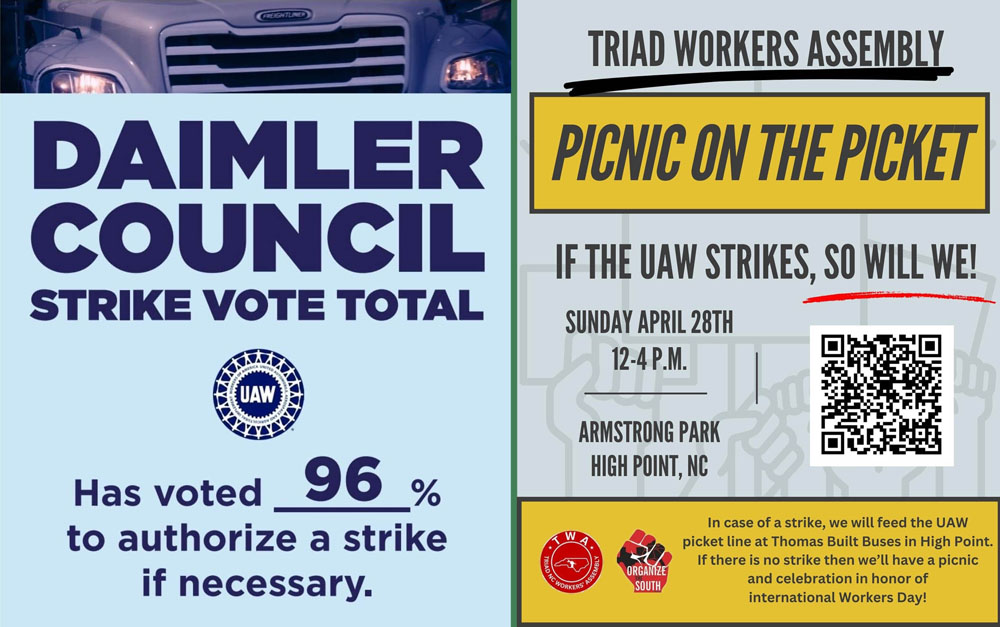
* * *
When this article is published, the strike deadline will have passed. Whether or not the strike happens, solidarity is needed now more than ever not only to maintain this political moment, but to push it forward.
On April 23, several rallies for a Global Day of Action in support of the UAW struggle at DTNA were held not only in North Carolina and across the country, but outside of the U.S., too. Rallies happened at all four union plants in North Carolina, as well as at the two parts-distribution facilities in Atlanta and Memphis. Another action at the DTNA corporate headquarters in Portland, Oregon was organized by the Oregon AFL-CIO and the UAW. There were even actions at the Daimler Truck plants in Mexico and Brazil. The UAW is working in tandem in Mexico with the truckers’ organization Tamexun/Truckers Movement for Justice, and in Brazil, they are working with the union CNM-CUT, which represents workers at the massive Daimler plant in São Bernardo do Campo.
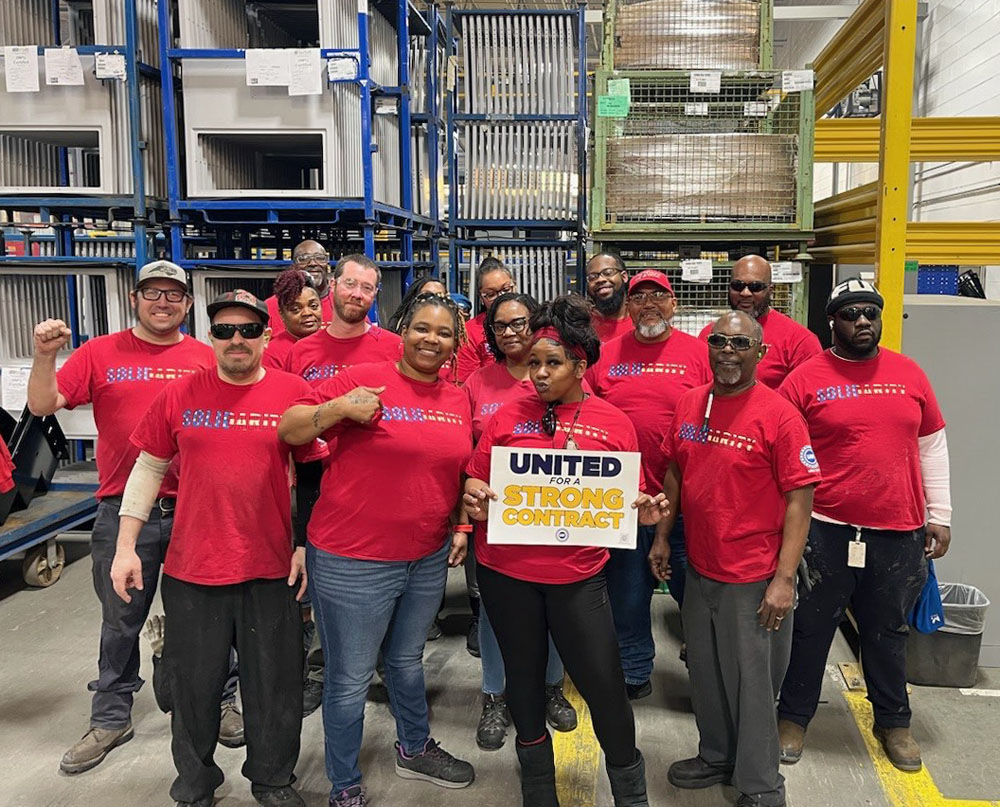
Finally, the Triad Workers Assembly, a chapter of the Southern Workers Assembly, has organized a “Picnic on the Picket” action to take place starting at noon on Sunday, April 28. This is scheduled just a day and a half after the DTNA contract expires at midnight on Friday. The “Picnic on the Picket” action will convene at Armstrong Park in High Point, NC, a few miles from the Thomas Built Buses plant. If the workers strike, supporters across North Carolina are encouraged to join the caravan to the picket line at Thomas Built Buses to stand in solidarity with striking workers, as well as bring food and other supplies to the picket line. (If there is no strike, a picnic will still be held in Armstrong Park in honor of International Workers Day.)
A victory at DTNA would be a signal, heard far and wide, that it’s possible to win a better life through organization and union power. Major union votes and victories in the South, where the status quo of oppression and exploitation have historically run so high, create the possibility for beginning to completely transform the political system in this country, and for pushing the entire class struggle forward to a new horizon.
How to Support
The regular bargaining updates provided by the union are all available online.
On Instagram, follow:
To support GCAE/NCAE going forward:
- Become a community ally.
- School employees can become a member of the union.
- Contact your BOE and BOC representatives to tell them to fully fund public schools.
Categories
We want to hear what you think. Contact us at editors@tempestmag.org. And if you've enjoyed what you've read, please consider donating to support our work:
DonateJoel Sronce View All
Joel Sronce is a writer and activist from North Carolina, currently living in New York. He is a member of Tempest and the Greensboro Revolutionary Socialists.
